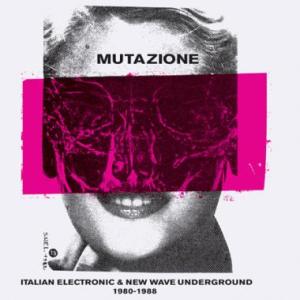Various Artists Mutazione: Italian Electronic & New Wave Underground 1980-1988
Mutazione has its strengths and weaknesses, but there’s little question that the compilation is focused […]

Mutazione has its strengths and weaknesses, but there’s little question that the compilation is focused on what is essentially an undocumented patch of musical history. Compiled by Alessio Natalizia, one half of the London-based Kompakt duo WALLS, the two-disc set runs a genre-bending, 26-track gamut of DIY music that rose out of the end of a 15-year period of social upheaval, student protest, and terrorism. Beginning in 1968 and lasting through the early ’80s, Italy was plagued by divides between its new and old blood and conflicts between extreme factions on the left and right of the political spectrum. Amidst the chaos, Italians also sought to advance the country’s art, and that struggle is at the center of Mutazione. The period, now known as the Years of Lead, sparked a vital era of Italy’s musical underground, one that’s largely been forgotten (and is likely to become less and less known as Italo disco cements its place in historical ubiquity). Given that backdrop, Mutiazone undoubtedly treads some fascinating ground and uncovers some real gems; the letdown is that despite all the effort and knowledge behind it, the compilation ultimately falls short.
Almost all of the music on Mutazione was inspired by the North American punk movement of 1977. The result is a record that culls from a plentiful sampling of genres; there are bits of post-punk, industrial, Krautrock, degraded disco, and raw electronic experiments, all of which are delivered with amateur sound quality. Very few of the artists on the compilation had access to professional equipment and traditional means of distribution, forcing the outfits to make do with what they had. A lot of music was also recorded in squat houses and underground meeting places, so there’s an unmistakable hurry and lack of polish to the recordings. Most of these cuts had all but disappeared, having been distributed only through zines, propaganda, and limited-run, self-released cassettes.
Politics and paranoia fuel most of Mutazione. The Years of Lead were a costly time in Italy’s history, most especially in terms of human life. More than 2000 deaths, the causes of which ranged from guerilla warfare between rival militia, bombings, and assassination attempts, were totalled by the time 1980 hit. The mood is set early on with an abrasive—and addictive—couplet from Die Form and Neons, both of which are heavily indebted to Joy Division and Cabaret Voltaire, particularly in terms of the music’s aggressive momentum. Mutazione‘s most haunting—and enduring—moment is Laxative Souls’ “Niccolai,” which beds a clashing slab of brooding ambience and white noise with the phone call made by the terrorist group Red Bridges to the authorities, telling them where they can find the body of Aldo Moro, a crucial figure whose abduction and assassination upended the already chaotic distribution of power in Italy.
Most of the vocals on Mutazione are performed in English, both reflecting the influence of the American punk scene and many artists’ desire to not conform to Italian pop music and the establishment of the time. Still, the compilation is not consistently oppressive, and it’s no small irony that for a collection inspired by violent history, most of the best tunes here are the ones least reflective of it. These gems include the lo-fi funk of 2+2=5’s “Jacho’s Story,” the anthemic industrial of Rats’ “Please,” and Victrola’s buoyant, motorized “Maritime Tatami.” Mutazione‘s best stretch is in the middle of the second disc, particularly the rolling synth aerobics of Dortis Norton’s “Norton Apple Software,” which first appeared on an ambient LP sponsored by Apple in 1984. Similarly, the most traditional new-wave cut is the infectious and precious “Edges,” courtesy of Kirlian Camera, the only band here that eventually made it out of the underground and onto a major label.
At the same time, even with a good disc’s worth of material, Mutazione ultimately struggles under its own weight. As a historical artifact, it should be essential. But its focus is too broad and distracted by itself, which critically wounds what should be an eye-opening document. At first glance, the length of the tracklist seems impressive. However, with the exception of the aforementioned highlights, far too many of the tunes are founded upon There’s A Riot Goin’ On-lifted drum machines, harsh feedback, labored monotones, and store-bought synth work. What may have wound up being pointed political commentary in its time winds up being diluted by there simply being too much of it. Many punk and electronic-music enthusiasts will simply hear copycats and cheap replicas in the swath of tunes here, as opposed to a significant cultural movement.
This might be the fault of the liner notes, too: they’re equally baffling as the haphazard tracklist, as they’ve been overloaded with superfluous and personal information and don’t include enough political context. Whatever narrative the music of Mutazione is trying to plot, the liner notes get lost by describing its tracks geographically, out of order from how they’re sequenced. While this approach is understandable, this makes both learning and listening far more cumbersome than it should be, especially when one considers that most listeners will be newcomers to both the tunes and the history. Even though one can’t fault the compilation for its completeness, Mutazione could’ve easily been slimmed down into one disc, making for a more focused listen while sharpening its potential political and musical edge.

